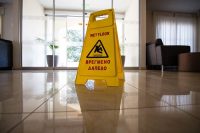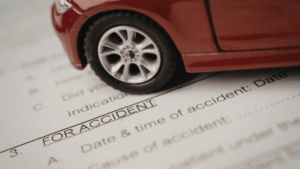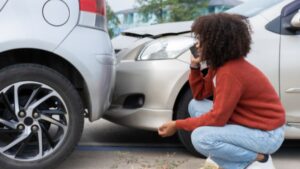
Dedicated Washington Slip-and Fall-Accident Lawyers
A sudden slip and fall or a trip and fall can result in significant pain. You might have a valid claim for damages when a fall occurs on someone else’s property due to negligence. Pursuing these types of claims is complicated. You need an experienced Washington slip-and-fall accident lawyer to help you.
The experienced legal team at Brett McCandlis Brown & Conner is here to help. We have years of experience assisting injured slip-and fall-victims in Washington.
Common Causes of Slip-and-Fall Accidents in Washington
Injuries from falls are commonplace, but occasionally someone is hurt from a fall that is caused by negligence. Some examples include:
- A fall on an icy sidewalk that should have been safely maintained;
- A fall in a parking lot caused by an uneven surface or tripping hazard;
- A fall on public stairs that were poorly lit or lacked safety railings.
- Poor lighting made it hard to see hazards and obstacles on the ground;
- A damaged staircase that should’ve been repaired;
- Electrical cords left out on walkways, which should’ve been put away;
- Spilled liquid on a store floor that was left for hours;
- Damaged carpet that had come loose and was not repaired; and
- A poor transition between flooring types.
Rules differ from city to city, but property owners could be responsible for maintaining the sidewalk in front of their property. That means clearing snow and ice too. For example, Seattle requires property owners to ensure snow and ice don’t pose a hazard to pedestrians. Tacoma requires owners to clear sidewalks within 24 hours of snowfall.
Speak with a Washington trip and fall accident attorney to verify the rules that apply in the city where your accident occurred.
Common Places Where Slip-and-Fall Accidents Occur in Washington
Slip and falls can happen anywhere, but they are more common in certain places. Examples of places where slip-and-fall accidents commonly occur include:
- Parking lots,
- Sidewalks,
- Hotels,
- Grocery stores,
- Shopping malls,
- Swimming pools,
- Parks,
- Gyms,
- Sporting venues,
- Movie theaters,
- Schools,
- Apartment and condo complexes,
- Parking garages,
- Workplace sites,
- Escalators, and
- Stairs.
While these examples are primarily commercial properties, slip and falls also happen at residential properties and public areas.
Common Injuries from Slip-and-Fall Accidents
Injuries from a slip-and-fall accident will vary depending on the circumstances of the accident. Many injuries can be severe, requiring significant medical treatment and a lengthy recovery period. Some common injuries we see in slip-and-fall cases include:
- Spinal cord injuries, including paralysis;
- Traumatic brain injuries;
- Hip fractures;
- Fractured and broken legs;
- Burn injuries from electrocution;
- Neck and back injuries; and
- Ankle and foot injuries.
Slip-and-fall injuries can be especially serious for older victims who are more at risk for complications. If an injury requires surgery, the surgery can also create a risk of further injury. For example, someone sustaining a hip fracture likely needs surgery. That surgery could lead to a stroke, resulting in permanent injuries. You need a skilled attorney for a slip-and-fall accident because, otherwise, you might receive far less compensation than your case is worth.
What to Do After a Slip and Fall in Washington
Here are the immediate steps to take if you’ve suffered an injury in a slip and fall accident in Washington:
- Get medical care. Broken bones, concussions, and joint injuries are common in falls, but symptoms may take hours to appear. A doctor’s visit documents the injury, ties it to the accident date, and establishes a treatment plan for future reference.
- Notify the property owner or manager. Broken bones, concussions, and joint injuries are common in falls, but symptoms may take hours to appear. A doctor’s visit documents the injury, ties it to the accident date, and establishes a treatment plan that can be referenced later.
- Take photographs of the area. Wet floors, ice, or broken stairs may not remain in place for long. Photos of the hazard, the lighting, and the surrounding conditions show exactly what was present when you fell.
- Gather witness information. People nearby may have seen the unsafe condition or the accident itself. Writing down their names and contact details allows you to confirm those accounts later if the property owner disputes your claim.
- Keep what you were wearing. Shoes and clothing may have marks from liquids, food, or debris, and scuffs or tears can indicate how the fall occurred. Store them as they are, instead of cleaning or repairing them.
- Speak with a lawyer. A slip-and-fall accidents attorney can request security footage, obtain maintenance records, and handle communication with the property owner’s insurer. Early involvement makes securing evidence easier and avoiding common mistakes with insurers.
Conditions at the scene can change quickly, which is why timing is crucial. Surveillance footage in many businesses is often erased or overwritten within days. Ice on a sidewalk may melt by the afternoon, and a broken step may be fixed before the next morning.
Once these conditions are gone, proving what caused the fall becomes much harder. Acting promptly, whether by taking photos yourself, asking someone to document the area, or contacting a lawyer to step in, helps ensure a reliable record of what actually happened.
Identifying Liable Parties in a Slip-and-Fall Accident
Determining who is liable for your injuries is often complicated. Please do not attempt to pursue a claim without first speaking with our lawyers for a slip-and-fall accident in Washington. We handle these types of claims regularly and are here to help you identify and file claims against all liable parties.
Property owners owe a duty of care to visitors. This means property owners have to keep visitors safe from hazards. However, the level of care a property owner owes a visitor depends on what type of visitor a person is. Visitors fall into one of three categories.
Invitee
This is someone invited onto the property to conduct business, such as a customer at a store. Property owners must keep their property reasonably safe and regularly inspect and fix hazards.
Licensee
This is typically someone on the property with implied consent, such as going to someone’s house for lunch. Licensees are generally social guests. Owners must make the property safe or at least warn of hazardous conditions.
Trespasser
A trespasser is someone who does not have permission to be on the property. Property owners have no formal duty to trespassers, but they cannot intentionally harm a trespasser by booby-trapping the yard, for example. A child can be considered a trespasser, but there are special rules for child trespassers. When it comes to child trespassers, property owners must take care and keep the property reasonably safe from hazards known as attractive nuisances, such as unsecured swimming pools and abandoned cars.
Washington Slip-and-Fall Laws
When pursuing a slip-and-fall claim, it’s essential to familiarize yourself with some applicable laws. Before collecting any compensation, you must prove the defendant was negligent. That requires you to show the following:
- The defendant owed you a legal duty;
- The defendant breached the duty;
- This breach of duty is what caused your injuries; and
- You suffered damages as a result of the breach of duty.
Washington is a pure comparative negligence state. That means you don’t have to prove the defendant was 100% at fault. You can still receive compensation even if you’re partially responsible. However, your settlement amount is reduced by your own percentage of fault. Meaning, if you’re 10% liable, you would only receive up to 90% of your damages.
Consider a few examples. A customer slips on a spilled drink in a grocery store aisle. The store should have cleaned up the hazard, but it may argue that the shopper was distracted by texting when the fall happened. In another situation, someone trips on an uneven sidewalk that the owner should have repaired. The property owner may still bear responsibility, but the fact that the person was wearing unstable or worn-out footwear could reduce the amount they recover.
These scenarios illustrate how responsibility can be divided and why evidence is crucial when property owners or insurers attempt to shift part of the blame.
Another important law to take note of is the statute of limitations. This law defines how much time you have to file your lawsuit. In most slip-and-fall cases, you only have three years to file a lawsuit against the defendants. That might seem like a considerable amount of time, but it can pass quickly.
The court will likely dismiss your case if you fail to file a lawsuit before the deadline.
Don’t jeopardize your potential compensation by trying to handle your claim alone. Speak with a slip-and-fall accident lawyer right away to give yourself the best chance of recovering the compensation you deserve.
Dealing with Insurance Companies After a Slip and Fall
Property owners’ insurance usually handles slip and fall claims. Adjusters work for the insurer, and their goal is to pay as little as possible. Knowing how they operate can help you avoid mistakes. Be on the lookout for the following:
- Request for a recorded statement. You are not required to give one, and doing so without legal advice can tie you to details given before you understand the full extent of your injuries.
- Early settlement offer. Insurers may offer a check within days of the accident, but these offers often come before doctors determine whether you’ll need follow-up care, therapy, or surgery.
- Shifting the blame to you. The insurance company may argue that you were distracted, that your footwear caused the accident, or that the hazard was obvious, to reduce or deny compensation.
- Medical authorization form sent by adjuster. Signing one can give them access to your entire medical history, not just treatment for the fall. They may point to old injuries or unrelated conditions to argue that your current problems do not connect to the accident.
For these reasons, limit what you share with an adjuster. Confirm only the basics: the date, the location, and that an injury occurred. Avoid speculating about how the fall happened or discussing your medical history in detail.
Letting a slip and fall accidents attorney handle these conversations removes the burden of dealing with adjusters and ensures that any settlement reflects the full cost of your injuries and losses.
Types of Recoverable Damages in a Slip-and-Fall Claim
Recoverable damages in a slip-and-fall claim depend on your injuries. In general, victims can recover compensation for:
- Medical expenses to date,
- Future expected medical costs,
- Lost wages,
- Future loss of earning capacity,
- Disability and disfigurement,
- Pain and suffering,
- Emotional anguish,
- Loss of consortium, and
- More.
Receiving the maximum compensation is dependent on the strength of your evidence. An attorney for your slip-and-fall accident can conduct a thorough, independent investigation to help gather evidence to support your damages claim.
How to Prove Negligence Against the Defendants
One of the real challenges in helping our clients recover after a fall is that you must prove the defendant was negligent. Our attorneys quickly undertake the process of preserving evidence, photographing injuries and the location of the fall, and interviewing witnesses before they become hard to locate. Our diligent Washington slip and fall accident lawyers spend great effort to ensure that every claim is strongly supported by evidence. Our goal is to help clients fight for the maximum compensation so they can move forward with their lives.
Helping Clients Heal Is Our jJob
Our law firm has worked with many clients injured in similar ways, and we know how devastating these injuries can be. Recovery can take months, and medical bills can be astronomical.
Common Questions About Slip and Fall Cases in Washington
Do I Need to Report My Fall to the Property Owner or Manager Immediately?
Yes. Reporting the accident as soon as possible creates a record of the fall on the property, which is essential for insurance purposes. If the location has a policy of filing incident reports, request a copy. If they refuse, write down the date, time, and the person you spoke with.
Delays in reporting can make it easier for the owner or insurer to argue that the fall never happened.
What If the Property Owner Claims I Was on My Phone or Not Paying Attention?
You may still recover compensation in Washington even if you were partly at fault. Under the state’s comparative negligence law, your share of responsibility reduces your damage but does not eliminate it.
If an owner claims you were distracted, photographs, witness accounts, and surveillance footage can demonstrate the hazard that required correction, regardless of your attention.
Can I Sue a Government Entity If I Fell on Public Property?
Yes. However, the process is different from claims against private businesses or landlords. Washington requires you to file a notice of claim with the government agency before filing a lawsuit. There are strict deadlines, often shorter than the statute of limitations for other cases. Examples include falls on city sidewalks, public parks, or government buildings.
What If I Signed a Waiver Before Entering the Property?
Waivers do not always shield a property owner from liability. They generally cannot excuse gross negligence or unsafe conditions that the owner should have addressed. For example, a waiver at a gym may cover minor risks, but it will not protect the facility if equipment remains in a dangerous condition or staff ignore a spill. Courts look closely at both the wording of these documents and the circumstances of the signing.
Contact Our Washington Slip and Fall Accident Attorneys Today!
As Washington personal injury lawyers, we have achieved exceptional results for our clients injured in falls, including:
- $450,000 for a woman who suffers a broken leg in a fall at a race track
- $175,000 for a client who sustained a badly fractured ankle in a fall on ice
We would like to help you. Contact us today. We have several offices in Washington State, including an injury law office in Seattle.


